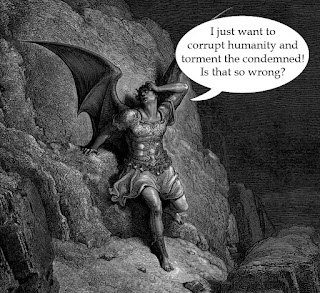I was talking with a friend this week about what makes a protagonist interesting and engaging, and the conversation soon turned to the other end of the spectrum. What makes a good villain? It’s a harder question that you might think. So much of what used to be common wisdom regarding a story’s antagonist is now being used to flesh out the good guy. In today’s media we are inundated with anti-heroes, men and women with dark pasts and questionable morals that seem to always carry the story with grim expressions and leave a horde of expendable innocents in their wake.
There’s even a minor trend among the glut of reboots wherein a former villain is now the “hero”. This is normally accomplished by focusing on a new, tragic backstory designed to give the character a sympathetic motivation. The goal with this sort of character is for the audience to say “Well of course they turned out evil, look what happened to them!” On the surface, it seems like a creative and interesting idea.
I call these type of stories concept plots. I can imagine the writer (or producer, director, etc.) sitting around and thinking “How can I be different? This story has been told a million times already. I know! I’ll make the villain the hero!” The problem is, no matter how clever this idea may seem, it’s the execution of that idea that will determine whether the end product is any good or not. Stories don’t succeed on good concepts. They succeed on good implementation.
Think of how many books and movies have plots that sound merely average when described in a single sentence but turn out to be both amazingly good and incredibly creative while the so-called imaginative-twist plot often results in a formulaic drone. I suspect this is a result of the entertainment industry focusing too much on a simplified pitch or logline. Projects are greenlit and books accepted based on how clever it sounds when boiled down to almost nothing. And nowhere is this more apparent than in a story’s villain.
There’s an old saying that a hero is only as good as his villain, and another that says that the villain is what makes the story. Personally, I think both of these statements are an oversimplification, but I get the idea. Villains are very important in certain types of stories. But just as writers should be wary of concept plots, they should be careful of writing concept villains. Rather than fretting over whether the villain’s motivation has ever been seen before (which is has, trust me) the writer should focus on making the villain resonate with the target audience. Here’s an example of what I mean.
I’ve been playing an RPG called Dragon Age: Origins which is a fairly typical epic fantasy tale of knights, swords, dragons, and all the other predictable tropes. But what sets this game apart is its characters, dialogue, and atmosphere, and the villain is a perfect example. From the first time I met him I disliked him, and my hatred grew throughout the game. While his motivation wasn’t particularly complex, it was the way his character interacted with everyone around him that pushed my buttons. Rather than laughing manically or rubbing his hands together in the shadows, he used misinformation like a weapon to turn other people against me. My frustration and powerlessness to beat him psychologically made me want to challenge him physically, adding real emotional weight to the final boss battle. It was direct, effective, and very powerful storytelling, and I can’t remember that last time I felt that much satisfaction at the end of a climactic video game encounter.
Of course, I’m not trying to start an anti-pitch revolution. It’s important for both traditional and indie authors to be able to sum up their novel into a short statement for the benefit of their potential audience. But just like an agent, editor, or reader shouldn’t start making sweeping judgements on a story (or a villain) based on a single short statement, a writer shouldn’t disregard their own work because the concept doesn’t sound creative enough. Remember that anyone can come up with interesting concepts, but it’s a writer that turns those concepts into art and entertainment.



